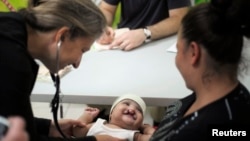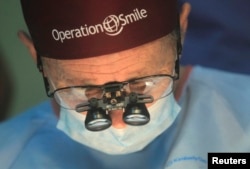A cleft lip or cleft palate is one of the most common birth defects worldwide. Before birth, babies can have a split, or cleft, in their lip and the roof of the mouth. This split normally closes between the 6th to 11th week of pregnancy. If this doesn't happen, and the baby is born with this split, doctors can usually fix it. But if the cleft isn't fixed, the baby can have serious health problems and a shortened life.
In the U.S. and other developed countries, corrective surgery is done when a baby is between three months and 18 months old. Surgical intervention is less common in less developed nations.
Dr. Albert Oh, a pediatric plastic surgeon, said he performs one or two corrective surgeries a week at Children's National hospital in Washington.
"We’re one of the busiest centers in the United States, and so my partner and I, we average over a hundred primary cases per year."
About one out of every 1,500 babies in the U.S. is born with a cleft palate. One out of every 900 babies is born with cleft lip. Babies of African descent have lower odds — one out of every 1,200 births.
Dr. Yang Chai at the University of Southern California said Asians are most at risk.
"If you look at a patient population worldwide, if you are Asian, the prevalence is about 1 out of 700."
These children are often stigmatized because of the way they look. But complications from a cleft lip and cleft palate go beyond the cosmetic. They impact speech and cause dental problems. A baby with a cleft palate cannot suck and is at risk of being malnourished. Malnutrition, in turn, causes stunted growth.
Dr. Ben Gitterman, a pediatrician who has worked as a volunteer in low-income countries to help these children, said the experience was life-changing.
"Seeing these kids and thinking, 'What a cute little 3 or 4 year old,' and finding that 3 or 4 year old was 7, 8 or 9. And because of the fact that they couldn’t process food, they couldn’t eat well. They had been so stunted ... by malnutrition. Not malnutrition from the lack of food in the community, but because they couldn’t feed properly because of the cleft lip and palate situation. These were tiny little kids, and I was in shock."
Gitterman has volunteered numerous times with Operation Smile, one of the charities that organizes surgical missions to help these children. In a Skype interview with Dr. Bill Magee, Operation Smile's founder, Magee said his organization's mission has expanded in the more than 35 years of its existence.
"Up until about 1999, all of our volunteers pretty much came out of the United States. Today, 70 to 80 percent of our missions are done by local people in their countries that we have trained."
Charitable organizations perform more than 80 percent of cleft lip and cleft palate surgeries in Vietnam, according to a 2016 study issued by Dr. William Magee III and his colleagues at the University of Southern California. Magee III is the son of the founder of Operation Smile.
The report showed how difficult it is for parents to get the surgery their children need in low and middle income countries. It's common in these countries for medical care to be paid in advance, which many families cannot afford.
Operation Smile is working to change that.
"It’s given us this incredible opportunity to understand how the infrastructure of surgery is so important ... and how to advance that infrastructure in countries all over the world," Magee said.
As for what causes this condition, genetic factors account for about 30 percent of cleft conditions. The mother's health is a contributing factor, but scientists are still searching for other causes with the hope of one day being able to prevent children from being born with cleft lips or palates.






